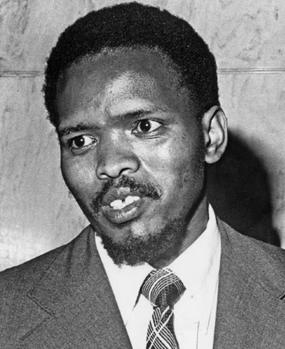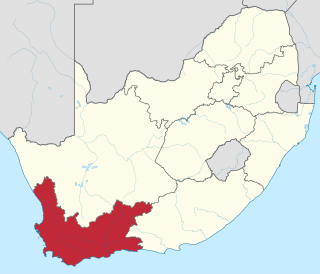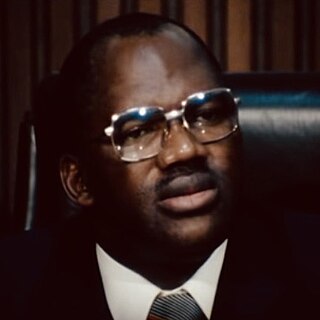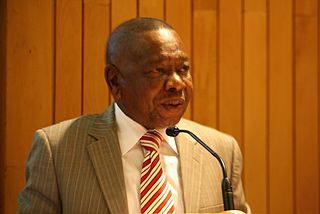
Bantu Stephen Biko OMSG was a South African anti-apartheid activist. Ideologically an African nationalist and African socialist, he was at the forefront of a grassroots anti-apartheid campaign known as the Black Consciousness Movement during the late 1960s and 1970s. His ideas were articulated in a series of articles published under the pseudonym Frank Talk.

The Western Cape is a province of South Africa, situated on the south-western coast of the country. It is the fourth largest of the nine provinces with an area of 129,449 square kilometres (49,981 sq mi), and the third most populous, with an estimated 7 million inhabitants in 2020. About two-thirds of these inhabitants live in the metropolitan area of Cape Town, which is also the provincial capital. The Western Cape was created in 1994 from part of the former Cape Province. The two largest cities are Cape Town and George.

Ciskei, officially the Republic of Ciskei, was a Bantustan for the Xhosa people, located in the southeast of South Africa. It covered an area of 7,700 square kilometres (3,000 sq mi), almost entirely surrounded by what was then the Cape Province, and possessed a small coastline along the shore of the Indian Ocean.
The Black People's Convention (BPC) was a national coordinating body for the Black Consciousness movement of South Africa. Envisaged as a broad-based counterpart to the South African Students' Organisation, the BPC was active in organising resistance to apartheid from its establishment in 1972 until it was banned in late 1977.

Lennox Leslie Wongama Ngweyesizwe Sebe was the chief minister of the Xhosa bantustan of Ciskei after its self-rule in 1972, and the nominally independent country's first president from 1983.He was the Chief of the AmaKhambashe Tribal Authority and his praise name (isikhahlelo) was Ngweyesizwe.
The R346 is a Regional Route in Eastern Cape, South Africa that connects Kidd's Beach with Stutterheim via King William’s Town.

The Black Consciousness Movement (BCM) was a grassroots anti-apartheid activist movement that emerged in South Africa in the mid-1960s out of the political vacuum created by the jailing and banning of the African National Congress and Pan Africanist Congress leadership after the Sharpeville Massacre in 1960. The BCM represented a social movement for political consciousness.
[Black Consciousness'] origins were deeply rooted in Christianity. In 1966, the Anglican Church under the incumbent, Archbishop Robert Selby Taylor, convened a meeting which later on led to the foundation of the University Christian Movement (UCM). This was to become the vehicle for Black Consciousness.

Qonce, formerly known as King William's Town, is a town in the Eastern Cape province of South Africa along the banks of the Buffalo River. The town is about 60 kilometres (37 mi) northwest of the Indian Ocean port of East London. It has a population of around 35,000 inhabitants and forms part of the Buffalo City Metropolitan Municipality.
The South African Students' Organisation (SASO) was a body of black South African university students who resisted apartheid through non-violent political action. The organisation was formed in 1969 under the leadership of Steve Biko and Barney Pityana and made vital contributions to the ideology and political leadership of the Black Consciousness Movement. It was banned by the South African government in October 1977, as part of the repressive state response to the Soweto uprising.
Bennie Khoapa was a social worker in South Africa during the 1960s and 1970s involved in the resistance to apartheid. He worked for YMCA, and was supportive of the young activists of the time, especially the young Steve Biko. Ultimately Biko and Khoapa founded the Black Consciousness Movement (BCM). In the movement, Khoapa was able to use his experience and connections to garner the support of various Christian organizations, and lend the BCM crucial credibility in its formative months. Khoapa was among those banned by the South African government due to their actions in the anti-apartheid movement.
Charles Nqakula is a South African politician who served as Minister of Defence from September 2008 to 2009. He also served as Minister for Safety and Security from May 2002 to September 2008.

Nyanga is a township in the Western Cape, South Africa. Its name in Xhosa means "moon" and it is one of the oldest black townships in Cape Town. It was established as a result of the migrant labour system. In 1948 black migrants were forced to settle in Nyanga as Langa had become too small. Nyanga was one of the poorest places in Cape Town and is still one of the most peaceful parts of Cape Town. In 2001 its unemployment rate was estimated at being approximately 56% and HIV/AIDS is a huge community issue.

Bonginkosi Emmanuel "Blade" Nzimande is a South African politician, sociologist, and former anti-apartheid activist who is currently serving as Minister of Science, Technology and Innovation. A cabinet minister since 2009, Nzimande was the General Secretary of the South African Communist Party from 1998 to 2022.

Internal resistance to apartheid in South Africa originated from several independent sectors of South African society and took forms ranging from social movements and passive resistance to guerrilla warfare. Mass action against the ruling National Party (NP) government, coupled with South Africa's growing international isolation and economic sanctions, were instrumental in leading to negotiations to end apartheid, which began formally in 1990 and ended with South Africa's first multiracial elections under a universal franchise in 1994.
Mapetla Mohapi was a member of the Black Consciousness Movement, who died in detention during Apartheid in 1976.
Dr. Maitshwe Nchuape Aubrey Mokoape was a South African anti-apartheid activist and a leader of the Pan-Africanist Congress and Black Consciousness Movement. He was first arrested and detained at the age of 15. He studied and worked alongside political anti-apartheid activist Steve Biko. In post-apartheid South Africa, Mokoape became a physician.
Sathasivan "Saths" Cooper is a clinical psychologist in South Africa who was born in Durban of Indian-South African background. He began to identify with the Black Consciousness Movement (BCM) and joined the South African Students' Organisation (SASO), and was one of the so-called "SASO Nine" student leaders arrested in 1974 for their anti-Apartheid activities. During this time Saths spent nine years banned, house arrested and jailed, including over five years in Robben Island where he shared a cell block with Nelson Mandela.

Ginsberg is a township on the west bank of the Buffalo River that is next to King William's Town, in the Buffalo City Metropolitan Municipality, Eastern Cape, South Africa.
Winnie Motlalepula Kgware was a South African anti-Apartheid activist within the Black Consciousness Movement (BCM). She was elected as the first president of the Black People's Convention (BPC), a BCM-affiliated community-based organisation in 1972.
Zanempilo Community Health Care Centre (ZCHC), infamously known as the "Biko Clinic", was the first primary health care centre initiative outside of the public sector in South Africa. It is located in Zinyoka Village, near King William's Town in the Eastern Cape. The clinic was established as one of the Black Community Programmes (BCPs) spearheaded by Steve Biko and Mamphela Ramphele.












